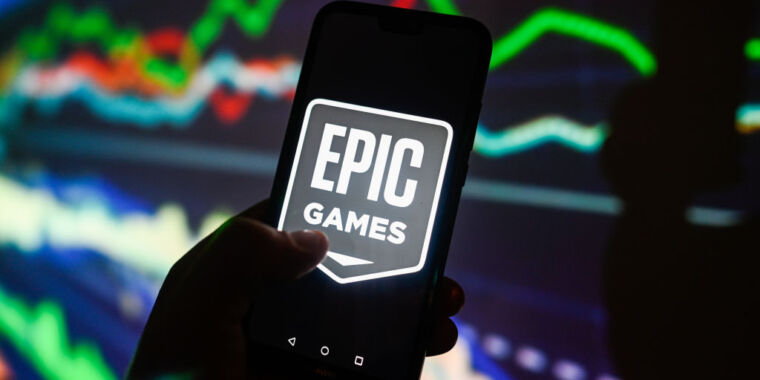Getty Images
Following its antitrust win against Google last year, Epic is now going after both Samsung and Google for allegedly conspiring to set up what it says is a similarly anti-competitive scheme on its Galaxy smartphones.
Epic’s newly filed federal lawsuit focuses on Samsung’s Auto Blocker feature, a setting designed to prevent Galaxy smartphone users from downloading “unauthorized” apps from third-party sources such as the recently launched Android version of the Epic Games Store. Introduced last year as an opt-in feature, the Auto Blocker feature is now activated by default during the initial setup of a Samsung phone following a July system update (the feature can be turned off with a simple toggle during setup or in the phone’s settings afterward).
Epic’s lawsuit takes a particular exception to the fact that Samsung doesn’t provide any way for a company like Epic to qualify as an “authorized source” that has been judged as safe under the Auto Blocker. “While Samsung half-heartedly claims Auto Blocker is a security feature, its operation is to block all competing stores, regardless of how safe and secure they may be—and without any assessment of their safety or security or any path for other stores to achieve ‘authorization,'” the suit argues.
Who are you protecting?
In effect, Epic argues, this means the Auto Blocker feature “renew[s] the moat protecting the Play Store from competition”—a moat that was at least partially dismantled in the Epic v. Google case verdict. By letting Google’s Play Store be the only other “authorized” source for apps under Auto Blocker, Samsung’s feature “protects, first and foremost, Google’s illegal monopoly—not Samsung’s Galaxy Store, which Samsung has never tried to make competitive.”
The new suit makes heavy reference to arguments from the Epic v. Google case alleging that an informal agreement between Samsung and Google has prevented the Samsung Galaxy Store from becoming a true competitor to the Google Play store. The suit notes that, while the Samsung Store is available on 40 percent of all Android phones, it represents only about 1 percent of all Android app downloads.
The lawsuit also calls attention to the timing of Samsung’s decision to turn on Auto Blocker by default just as Epic and other third-party App Stores were launching on Android. That timing is especially suspicious, according to the lawsuit, in light of Samsung’s initial Auto Blocker announcement last year, which left the feature off by default because, as Samsung put it, “[t]here are many benefits to intentional sideloading, such as enhanced customization and control over a device’s functionality.”
This fact pattern forms the core of Samsung’s argument that implementing Auto Blocker by default must have been “a coordinated decision by Google and Samsung to circumvent” the results of the Epic v. Google lawsuit. While the suit doesn’t provide any concrete evidence that such an agreement exists, it argues that “absent an agreement between Samsung and Google, it would be irrational for Samsung (or any company in its position) to entrench the Play Store monopoly.”
In a statement, Samsung said it planned to “vigorously contest Epic Games’ baseless claims… The features integrated into its devices are designed in accordance with Samsung’s core principles of security, privacy, and user control, and we remain fully committed to safeguarding users’ personal data.”

